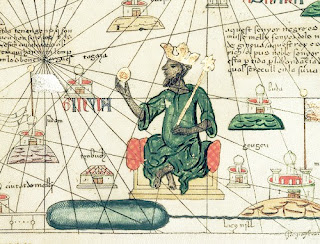He was the king of the Mali Empire from 1312-1337, when it was larger than all of Western Europe.
This was before European settlers arrived in Africa.

You can click on the picture to make it larger.
Mansa Musa was the grand-nephew of the founder of the Mali Empire, Sundiata Keita, and ruled over
Musa was a devoted Muslim, and Islamic scholarship flourished under his rule. Craftsmen and especially Islamic scholars came from all over the Muslim world to receive a free education at Sankore's guilds and madrasas.
By the end of Mansa Musa's reign, the Sankoré Masjid had been converted into a fully staffed MadrassaLibrary of Alexandria. The level of learning at
Musa expanded
On the way to Mecca, when he passed through Cairo in July of 1324, he was reportedly accompanied by a caravan that included thousands of people and nearly a hundred camels, giving away so much gold that it took over a decade for the economy across North Africa to recover, due to the rapid inflation that it initiated.
The Arab [historian] al-Umari records that Musa "performed so many acts of charity and kindness" that he ran out of money and had to take out a loan to be able to afford the journey home.
Musa's hajj, and especially his gold, caught the attention of both the Islamic and Christian worlds. According to Professor Ross E. Dunn, "In the history of medieval
Musa was succeeded in 1337 by his son Maghan and in 1341 by his brother Suleyman.
_____________________________
No comments:
Post a Comment